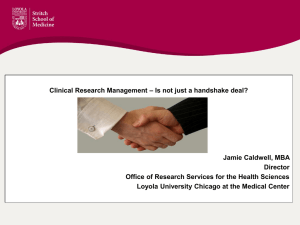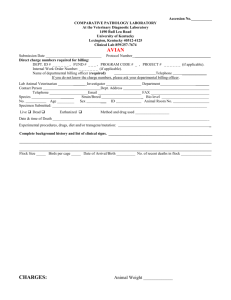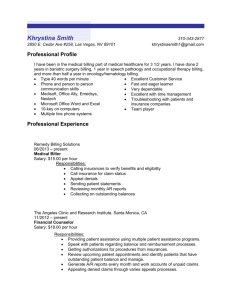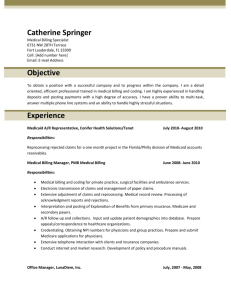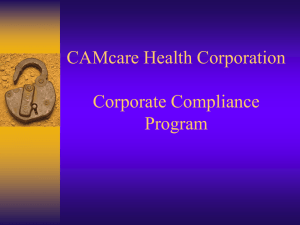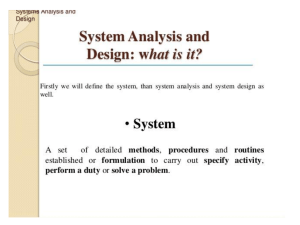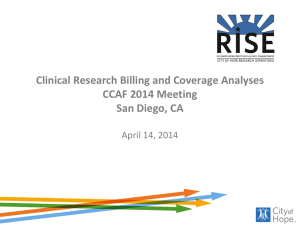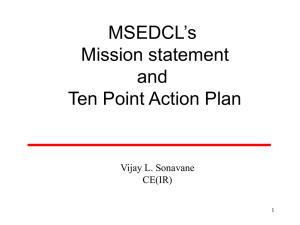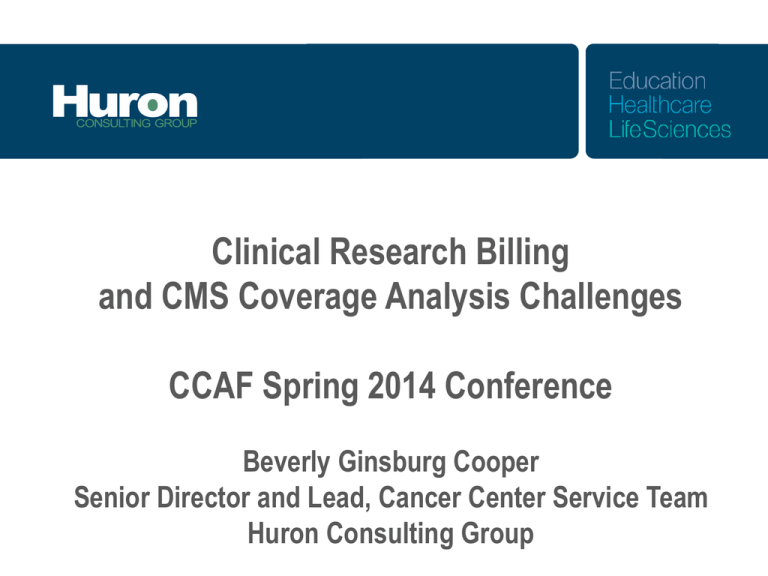
Clinical Research Billing
and CMS Coverage Analysis Challenges
CCAF Spring 2014 Conference
Beverly Ginsburg Cooper
Senior Director and Lead, Cancer Center Service Team
Huron Consulting Group
The Regulatory Climate: Overview
• Clinical research billing compliance continues to be a high priority
concern of cancer centers and their institutions
• In 2000, President Clinton first issued the executive memorandum
directing Medicare payment for routine patient care costs and costs
due to medical complications associated with clinical trial participation
• Many states and insurers followed Medicare’s lead
• Regulations and guidance from CMS remains unclear
• In 2011, HHS Secretary Sebelius stated that HHS has begun to address
inconsistencies
• Institutions bear the responsibility and consequences of
misinterpretation
2
The Regulatory Climate: Challenges Ahead
• CMS created an integrated data repository for Medicare, Medicaid,
and liability claims data to be used in identifying improper payments
• Health care reform legislation Increased funding for Medicaid fraud
and abuse control
• Cancer Centers and academic institutions are settling cases with the
government
3
Noteworthy Settlements
Voluntary
Disclosure
Whistleblower
• Rush University Medical
Center
• University of Alabama
• Emory University/ Winship
Cancer Center
4
Research Billing Requires an Integrated Team Approach
The research billing process is complex and
requires coordination and harmonization
between partnering institutions (the hospital,
the physician practice plan, and where
applicable, the university). The steps in the
process are:
© 2014 Huron Consulting Group. All Rights Reserved. Proprietary & Confidential.
5
•
Coverage Analysis
•
Budgeting and Contracting
•
Identifying and/or Flagging Research
Patients
•
Registration and Admission (Including
Pre-authorization)
•
Charge Segregation
•
Coding
•
Claims Processing and Invoicing
•
Study Close-out and Residual
Balances
5
Coverage Analysis Defined
A systematic review of protocolrelated documents to determine if
all the patient care costs in a study
are covered by the study sponsor,
other funding sources, or qualify
for reimbursement by third party
payers.
6
Why This Sounds Simple…But Isn’t
•
•
Federal policy is vague
When left to interpretation, institutions can interpret incorrectly
•
•
•
•
•
•
Therapeutic intent
Standard of care
Billable research services
Some centers have pushed the limits to maximize revenue
PI and staff may not know the rules
Checks and balances may not in place to catch problems
7
Examples of Common Billing Errors
• Billing services covered by sponsor
• Billing services promised for free in Informed Consent
• Billing services that are not “medically necessary”
8
Elements of Clinical Research Billing Compliance Program
© 2014 Huron Consulting Group. All Rights Reserved. Proprietary & Confidential.
Coverage Analysis: Blueprint of SOC and research charges that meet the reimbursement rules
Revenue Cycle Management: Policies and procedures to direct the processing of SOC and research charges
Training and Development: Advance competencies is research billing
Auditing and Monitoring: A plan to maintain low error rate and monitor impact of training
Communication and Technology: a plan to increase awareness and facilitate compliance
© 2011 Huron Consulting Group. All Rights Reserved. Proprietary & Confidential.
9
9
Advantages
• Enables early detection of non-covered items and services
• Reduces inappropriate billing
• Facilitates ability to recover allowable costs
• Reduces risk of fines and loss of reputation
10
Panelists
Ashley Baker Lee
Current: SVP, Research Operations City of
Hope
Prior: CAO, John Wayne Cancer Institute
Michael Bertram
Current: Administrator, UAB Cancer Center
Prior: Administrator, UAB CFAR
11

